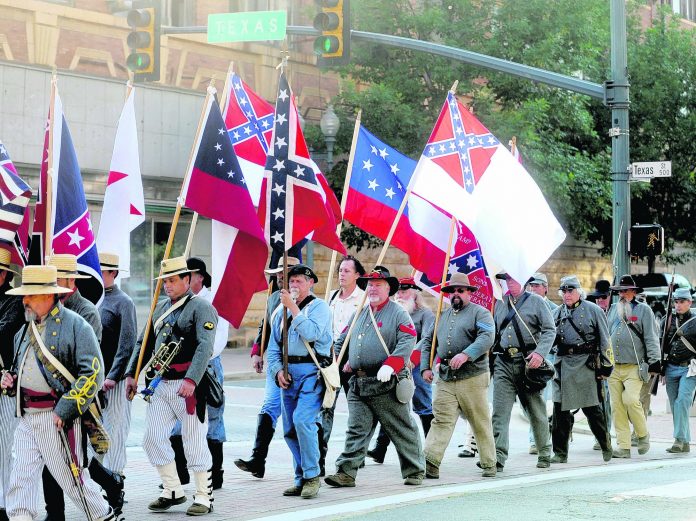
A group that was denied permission to march in a Louisiana city’s Christmas parade when it insisted on carrying Confederate battle flags asked a federal appeals court Tuesday to revive its lawsuit alleging constitutional violations.
The permit for the Louisiana Sons of Confederate Veterans was denied in late 2015, months after the slayings of nine black worshippers at a South Carolina church by white supremacist Dylann Roof. Pictures on social media of Roof posing with Confederate battle flags led to renewed opposition to public displays of Confederate iconography around the nation.
In the city of Natchitoches, a nonprofit group that organized the annual parade denied a permit to the SCV after city officials expressed concerns that some in the city would be offended by the display of Confederate battle flags, and that protests might disrupt the procession.
Judges with the 5th U.S. Circuit court of Appeals panel that heard arguments Tuesday made clear that the Confederate group had legitimate freedom of speech issues if a governmental agency denied them a permit — even amid security concerns.
Judge Catharina Haynes rhetorically asked whether African Americans could be denied permission to march in a parade if white supremacists threatened to disrupt the event.
But the case hinges largely on the role of a nonprofit group — the Historic District Business Association. That group, which runs the parade under an agreement with the city, denied the permit.
Last year, U.S. District Judge Dee Drell dismissed the lawsuit, which named the city and the HDBA as defendants, saying the HDBA was not a government agency, or “a state actor” in legal terms, and that the city did not issue the permit.
Arguing for the SCV, attorney Dick Knadler cited a letter written by the mayor and concerns expressed at city public hearings. He argued that the HDBA acted at the behest of the city and in a government role.
“My client is not a government entity,” responded Jack Truitt, attorney for the HDBA. And attorney Ronald Corkern, arguing for the city, insisted that permitting was not a city decision.
Attorneys questioned both sides closely on how city officials’ actions might have influenced the HDBA.
“The mayor had his lawyer conduct the meetings,” Judge Jennifer Elrod noted when Corkern discussed city officials’ efforts to reach a compromise with the SCV.
Questioning Knadler, Haynes questioned whether the mayor’s public opposition was a binding city policy, absent a vote by the City Council.
The three-judge panel — Elrod, Haynes and Leslie Southwick — gave no indication when they would rule.



















